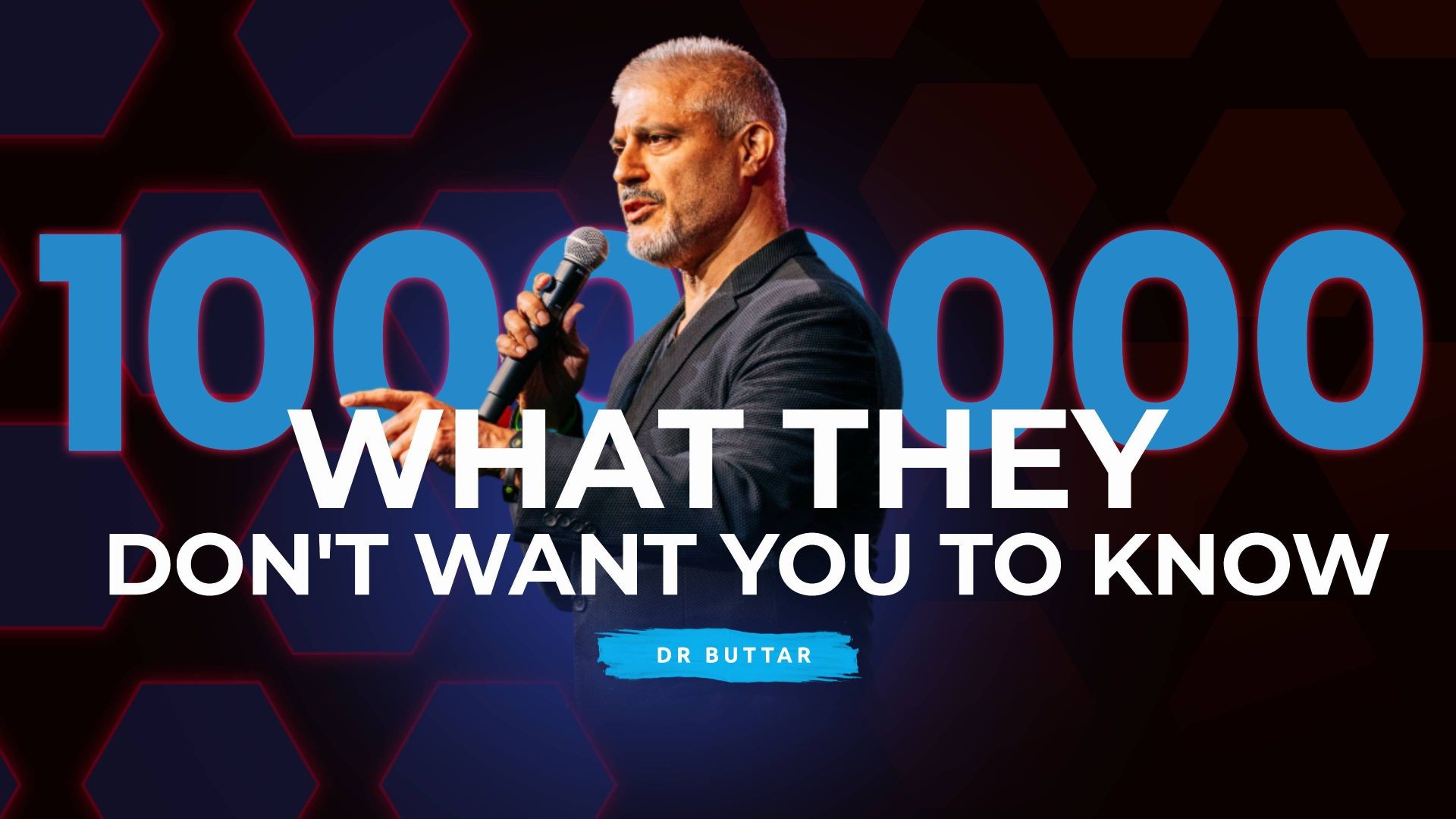The Evil of the Globalist Agenda: Humanity's Fall into Digital Slavery
"Globalists believe in using data to control people's behavior to create a new type of human." by - L. Norman
Summarize this article!
Globalists have developed an intense interest in futurism and the idea of godhood. Their ambition is to use data and technology to gain unprecedented levels of control over the behaviors, thoughts, and emotions of those they consider inferior. They want to produce lifeforms with capabilities that surpass those of natural humans and craft a society where their goals are prioritized over everything else. While the implications of their vision are alarming to many, globalists remain relentless in their pursuit of power by fusing science and humanitarian ideologies.
It's a stark difference in behavior from the everyday person on the street to what we have seen from government authorities and their agents during the covid lockdowns and enforcement of vaccine passports. Conscience, ethics, and empathy guide ordinary people, whereas higher-functioning psychopaths and sociopaths appear to guide those in power, as evidenced by some of their cruelest measures. It has become abundantly clear that they have a long game they wish to pursue, regardless of how many lives are destroyed or exposed to danger. Thankfully, more decent people are waking up to these realities and are willing to stand against such tyranny. (1)
This is the main article!
Recently, I have noticed false rhetoric being pushed by globalists that paint their intentions as benevolent. Unfortunately, these designs are far from beneficial for the general public and, in fact, often benefit the wealthy few. Globalists capitalize on society's lack of education on political systems and use manipulative tactics, like fake philanthropy, to make us think they are doing what is best for everyone. If more people were aware of the desired plans they were attempting to dictate to us, there would be much more resistance against this false narrative. We could instead focus on initiatives that will truly improve our country's Democratic processes and help all members of society.
The mainstream media has recently increasingly accepted the idea of questioning global organizations such as the World Economic Forum. People are now less likely to be stigmatized for asking to probe and challenging questions about international institutions. Instead, people have been permitted by those in power to voice their concerns, so long as they don't point fingers or make wild accusations of conspiracy. In a constantly changing world, it is more important than ever to be aware of who influences decision-makers and how these decisions might affect everyday life around them. The need for vigilance is paramount, and the mainstream media's willingness to give attention to alternative views can only benefit society.
The Liberty Movement has long perpetuated the notion that globalist groups are nothing more than a myth or, even if they exist, do not have any real power or influence over our everyday lives. In recent years, however, we've seen an undeniable shift in the attitude of some members towards this issue. By displaying propaganda that harks back to a darker period of our history, they send a direct message: powerful entities are at work and must take their activities seriously. They recognize the gravity of the situation, as well as its implications for all citizens around the world. It remains to be seen whether this sentiment will spread further throughout the Liberty Movement in the coming years.
The acknowledging of certain truths does not necessarily mean one is compelled to agree with conclusions made around that truth. Such is the case surrounding the influence of globalists. It is increasingly common to hear thoughtful commentary in the media surrounding corporate entities and globalist influences on government affairs and economic outcomes, but dismissing any idea of ulterior motives as "tinfoil hat talk" seems presumptuous and presumptuous dismissive. After all, if globalists have amassed so much institutional power within current systems, then assessing their intentions should be taken more seriously than in the past. Denying that they are led by those of questionable ethics and plans should not be dismissed so quickly - a healthy degree of skepticism never hurts anyone when considering such influential parties at play.
The recent rise in support for anti-globalist ideals has been linked to the drastic narrative shift observed among many of the world's governments since the start of the pandemic. As more and more people have become aware of globalists' true intentions, they have started to reject what had seemed inevitable months prior. This opposition has taken on many forms - from civil disobedience and public demonstrations to further educating oneself through reading, research, or attending town hall meetings. These actions – combined with greater public awareness – helped paint a clearer picture of how globalists use Covid-19 as a tool for exploitation and power-grabbing. However, it doesn't appear that their hold on our lives will last much longer. There are now far too many of us who know about their plans, leaving them without much cover when making new directives or implementing mandates.
This indicates the globalist strategy's attempt to adapt given their failed endeavors in the west. Despite claiming to have a certain level of influence, globalists deny any wrongdoing. They insist on promoting themselves as benevolent or indifferent actors, which many see as misrepresenting their actions and intentions. Nevertheless, their goal has stayed the same. Vaccine passports, coupled with perpetual Chinese-style medical tyranny, remain at the heart of their agenda, regardless of what other tactics they may employ to gain more traction with their causes.
In this dizzying pandemic, it can be hard to uncover the truth amidst lies and deceit. But when it comes to the potential manipulation of covid-19 for political gain, there is one lie severely impairing our ability to move forward with meaningful solutions. This lie is rooted in the narrative that Klaus Schwab of the World Economic Forum was excited in response to covid-19 from day one. The reality, however, is far from what many conspiratorialists believe. In actuality, Schwab and his team have been focused on driving systemic changes within our economic system for many years, including their "Great Reset" proposal. While this does not diminish the tremendous suffering inflicted by covid-19 worldwide, it does allow us to understand at a deeper level what responding effectively to this crisis looks like beyond just weighing into conspiracy theories.
Klaus Schwab's fourth industrial revolution is a dystopian future where Artificial Intelligence controls all aspects of society, leaving us without any sense of autonomy or privacy. Dubbed "smart cities," the envisaged enclaves would essentially be surveillance states whose inhabitants would face severe restrictions due to advanced carbon taxation. Increasingly popular within the WEF is the concept of a 'shared economy,' where citizens become neo-tenants with no ownership over anything. At the same time, their privacy is sold off so openly that it's almost considered normal. It is a worrying development and should be roundly resisted if we want to protect our democratic freedoms.
The reality of the situation, as many are coming to learn, is far more sinister. The aims of the elites and globalists undergirding technocracy goes beyond anything moral or reasonable; they seek to control humanity's move towards a digital age so that all decisions are at their command and convenience. The mindsets of these elite circles often feature an arrogant disregard for human life and all-too-often feature aspects of eugenics. This unacceptable mode of thinking cannot stand lest we lose control and freedom.
It is a fallacy to believe that globalists are not like us. Their blatant disregard for humanity does nothing to change their status as part of it, and their goals are often vastly different from the majority of people. While most everyday citizens strive for comfort and stability, globalists continue to work towards world domination in pursuit of complete control over resources and people. Despite this radical ambition, their human desires remain as powerful as those of any other person, which only serves to demonstrate how far they have deluded themselves in an attempt to propagate an ideology.
It is becoming more and more evident that the people in power behind the lockdowns and vaccine passports are not concerned with the welfare of individuals or their freedom. Their true ambitions lie elsewhere and have little to do with ethics, conscience, or empathy. These higher-functioning psychopaths and sociopaths manipulate events to suit their long game, regardless of how much harm they inflict. It is alarming when we consider who holds the reins of power today - instead of conscience-driven justice, we see malicious intent driving policy decisions. We can only hope that this will not last forever. (2)
Jacinda Ardern's comments from a year ago prove the disregard by some leaders for their own citizens' well-being in their efforts to carry out authoritarian initiatives. Despite numerous studies confirming that vaccination mandates are ineffective, Ardern unsurprisingly takes pride in creating a two-tier class system within her own country, highlighting her disregard for her people. Unsurprisingly, no remorse or guilt is expressed in her mannerism. Such attitudes are cause for grave concern, and governments worldwide must consider approaches that prioritize the interests of their citizenry first and foremost.
https://www.youtube.com/watch?v=ZdMSRolWCyQ
It is easy to brush aside the idea of a globalist conspiracy, and indeed, the response to the Covid pandemic has provided evidence contradicting such beliefs. However, beyond this, it is essential to consider just how influential organizations like the World Economic Forum are. To understand their impact and intentions, we must explore their philosophical roots - Futurism and godhood. These two concepts inform the WEF's influential position within the international arena, providing solutions to social issues from high on. It may be hard for some people to accept that there is an undercurrent that unites all world events. Still, by examining the principles behind organizations such as the WEF, we can appreciate why these vast networks have become so powerful today. (3)
Futurism is an ideological movement full of optimism, believing that we must throw out all old systems and ways of thinking for humanity to progress in the world. This is a somewhat radical call for breaking traditional modes of thought, including heritage, religion, and moral codes. Futurists believe that embracing new technologies and social innovations will help us transcend narrow-mindedness, rid ourselves of creating cycles of bigotry and ultimately reach heights never seen before. Whatever your opinion on whether this mission is possible or too extreme, one thing remains true; futurists are devoted to the promise of technology's power to better our future.
Futurists hope for a future in which human beings transcend their current physical, mental, and spiritual limitations, obtaining what has been termed 'godhood.' Yuval Harari's 2018 presentation to the World Economic Forum gave insight into such ambitions of globalists - where artificial intelligence applications would lead to total domination by a select few over the natural world and our collective will. Not much is known yet of the specifics or paths to reach godhood; however, if successful, it could revolutionize human civilization and unlock the critical mysteries of life.
https://www.youtube.com/watch?v=CMRPD_wV__k
Yuval Harari's idea that our current human existence could end through digital evolution and human hacking in the next century is a theory worth exploring. Reformulating the very nature of our species with artificial intelligence, gene editing, and unprecedented computing power has undeniable appeal, yet, it raises questions about consequences for future generations. While giving priority to technology potentially carries some risks, Harari argues that it is something we must work hard to avoid as we navigate an unpredictable global landscape in the twenty-first century. His conclusions may be rooted in elitist biases and ignore numerous psychological and social realities. Still, these complex considerations should focus on his basic premise that dramatic changes are coming sooner rather than later.
The audacity of the ideas put forth by the World Economic Forum is only starting to hit home. Harari's notion that data is the new Holy Grail, a point I have discussed before, reveals that those at the top envision an entirely centralized system based on human data in which our thoughts and behaviors become commodities. This means everyone will be part of this economy regardless of economic or social class. Our lives and privacy will become an open source for transnational companies to mine for profit. Our data will be weaponized against us; this is a future we should all be aware of and guard against.
Globalists have long fantasized about wielding omniscient power akin to a deity. These aspirations are detailed in Yuval Harari's dreams of a "digitized man,"; the notion of controlling people's behaviors, hacking the body and mind to create human puppets or even augmented super beings. This chilling ambition lies at the heart of globalists' embracing data as their most prized resource: this knowledge can be fundamentally utilized as a tool for control. These ambitions are profoundly concerning, yet if guided responsibly, they could usher in an era emancipated from irrational faith in God and open humanity up to greater scientific exploration and enlightened self-governance.
In recent interviews, technology journalist Yuval Harari has argued that democracy right now may have to be traded for a digital dictatorship of some variety. While this sounds alarming at first glance, his assertion is based on the notion that only a centralized power can enforce regulations necessary to keep the digital wellspring from becoming a wild ocean. Listed as one of TIME Magazine's hundred most influential people of 2020, Harari's views on democratization come from his position in the World Economic Forum – where "democratic" governments are seen as inefficient players in someone else's game. Hence, "digital dictatorship" is looked upon by many as merely a way to codify global capitalism with increased precision and hegemonic control. However, Harari does open up a conversation about who should form such a conglomerate and have unprecedented power over data collection and security - the logical conclusion is that yet another unaccountable entity would take over, allowing no space or time for civil input.
Yuval Noah Harari's call to leave control of data regulation and artificial intelligence in the hands of the United Nations speaks volumes as to what his true intention is. He knows it would empower him and other globalist figures in the UN-backing UNESCO with such decision-making authority. This goes against a democratic ideal, where the people maintain power over their data and AI usage. Harari realizes this too. Still, rather than admitting it, he confidently passes responsibility to a towerful of like-minded individuals who could ultimately have an alarming level of authority when it comes to regulating AI and data.
As Yuval Noah Harari, the renowned historian and lecturer spoke of the digitization of humanity and the globalists who desire to unify the planet under their banner, it became increasingly clear that he was in no way suggesting any obstruction to these developments. Instead, Mr. Harari debunked old-fashioned ideas such as 'going back' to old habits, instead advocating for a blank slate towards innovation for future generations. The concept seemed intriguing, even utopian-like - yet ironically somewhat futuristic and robotic, an idea that may appear far from reality as we know it. It is undoubtedly fascinating to witness how this digital transformation will play out over time and how it may redefine our world.
Globalists dream of a society with the precision of an algorithm – a world governed by data and uniform protocols that leave little to chance. And yet, human nature mitigates this kind of structure. Harari would like it to be otherwise, but it cannot reduce people to processes and procedures. We are emotional beings capable of shifting our beliefs and actions in unpredictable ways. People have habits and passions, creating opportunities for paradoxes and surprises on a larger scale - moments that present themselves at the intersection between creativity and serendipity. It is here where we can witness effective changes, awakenings showing us the power of human ingenuity in all its complexity.
Psychopaths are complex individuals, and their behavioral patterns can sometimes be difficult to predict. However, when considering the actions of a collective group of psychopaths like the World Economic Forum (WEF), it is no surprise that their vision for the future is heavily centered around Artificial Intelligence, coding algorithms, and the rigid structure of technocracy. They obsessively value these things because they lack the human qualities necessary to think outside this worldview; they have little imagination, intuition, or foresight. Fundamentally, they fail to recognize that this "data Shangri-La" can never accurately represent human civilization as it divorces elements like emotion, connection, and empathy that make life meaningful. In essence, this future paradise so greatly admired by some is an affront to humanity itself – it is the future that the non-humans seek to prevent everything that makes people unique.
As globalization continues to dominate modern society, the idea of a "brave new world" where robots can take over many of humanity's jobs has been steadily growing in popularity. Unfortunately, this is likely just another fantasy peddled by the powerful few who want to capitalize on its potential. When it comes down to it, we mere mortals still need to do the grunt work and will remain saturated with sweat that machines may not be able to replicate. Weil still has people farming, maintaining infrastructure, manufacturing, and serving as security forces. So forth - so long as suffering and inequality exist in our world, there will always be someone to fill those roles. Humanity will still create all the goods and services necessary for life in this brave new world - but only those with the power and influence can call it their own.
A fundamental truth of the digital age is that data underpins economic progress. By collecting and analyzing data, companies shape our experience of the world around us and make decisions to maximize profits or cut costs. But this reliance on data can obscure a more profound reality and create an illusion that hides underlying truths. Our current economy has increasingly relied on abstract concepts like algorithms, artificial intelligence, and machine learning. As a result, heavy reliance on these methods contributes to a false perception of objectivity while obscuring disparities in access to resources and their effects on different communities worldwide. As such, we must be aware of the potential pitfalls when building an economy around data to ensure equity is part of any equation in the future.
Data is a lot like the fabled Phoenix, which can rise from its ashes: just when we think the information it holds is absolute and reliable, it can quickly twist into something unrecognizable. Data certainly has tremendous value and potential, but without careful consideration of the interpreter and their subjective biases, it can become vaporous and devoid of any real meaning. Though algorithms offer powerful insight into specific situations, they should also be handled cautiously, as engineers have programmed them with beliefs that cannot escape. In short, though data analysis may be of great utility, one must remain acutely aware of how subjectivity seeps in with interpretations to ensure accuracy.
As we become increasingly dependent on technology, the potential for malicious use exists. Ever since Harari's anecdote of an algorithm that claims to "know" one's sexuality before they do go public, an important question has come to the forefront: how can one defend themselves against algorithms written with ill intentions? It is a slippery slope - if you are naive enough to believe the infallibility of the technology, a false identity narrative could be established, and you might act in ways counter to your true identity. This could allow those who wish to harm--whether social or physical--to manipulate and control you. Of course, as in all cases, education is critical; understanding what it means to rely on technology too heavily can provide protocols and defenses from getting hacked.
To those with enough money, power, and influence to pursue elitist obsession of more, it is an attempt to fully transcend their mortality by body hacking or reading the minds of those without such power. While this may appear exciting for science fiction enthusiasts, it ignores the fundamental unpredictability of human nature that cannot hack away something like a conscience or imagination with a few simple calculations. Even from a psychopathic view, a soul contains much more than data points could ever quantify. Any attempt to do so would only produce shallow answers that can never truly convey all that lies within us.
Data-based systems used to store and manage personal information seem like natural extensions of our lives, sometimes taking over vital responsibilities. This is where the World Economic Forum attempts to control individuals by giving data-driven organizations legitimacy. However, convincing the public may be easier than hacking this system. If we can persuade people to implant their cell phones in their skulls or utilize new technologies shortly, then there's undoubtedly a chance humanity can become hackable. Governments' and organizations' ideas may only work if they incorporate user opinion. Therefore, persuasion has the potential to trump any amount of data that could be collected or used to take advantage of vulnerable communities.
We cannot let machines construct our moral compasses. Without conscience, empathy, and principles at its heart, algorithms can supplant morality and render it relative by default. Its binary nature then becomes concerning; good and evil concepts are degraded to two extremes with few nuances in between. We must create codes of ethics around these new technologies to let us make well-informed decisions about their use and ensure morality remains a priority for us--not the machines.
Humanity needs to realize that they have the power to choose a different, less tech-focused path. It may seem impossible at times, but if enough people were focused on living free of technology's grasp, they could demolish the digital empire of the globalists. Many feel that those in power will eventually impose their will one way or another – however, the reality is that their efforts are futile without our approval. We can defy them by exercising control over our lives and shunning digital distractions to embrace technology for what it truly is: an incredible asset for society.
To battle the evil conspiracy of total centralization, it is necessary to be aware of its existence and boycott it. People must come together to reject these global systems intent on suppressing individual beliefs and intuition. We must recognize our humanity and reclaim our autonomy by acknowledging the importance of experience and what cannot be computed with an algorithm alone. Rejecting these oppressive global structures requires courage and collective action, but with thoughtful planning, people can take back the power that has been manipulated from them by malicious forces. Humanity can win this battle only by uniting to create a more equitable and authentic world. We are all in this together, and it's time to take our lives back. It's up to us to decide how we want our future to look - free from manipulation or enslaved by technology. The choice is yours. (4)
By understanding the implications of technology use and recognizing that they might use data-driven systems for malicious purposes, people can fight against globalist hegemony from taking control of society. As information becomes increasingly personalized and accessible, the need for personal autonomy has become more significant than ever before; it is incumbent on individuals to recognize their rights and exercise them with courage and conviction. So while technological advancement may seem like an unstoppable juggernaut, it can only become as powerful as we allow it to be. We must choose wisely and act courageously to create a world free from manipulation and full of freedom and justice for all.
The power of choice lies within us. It's up to us to decide how technology will shape our lives–for better or worse. The decision rests with the individual, but we can ensure that whatever solutions are implemented are used for good. With collective action, we can ensure tech giants do not use their platforms to manipulate us into submission and preserve autonomy in a digital age where data-driven systems threaten our fundamental liberties. Ultimately, it is up to us – the people – to take back our power and create a world that works for everyone.
It is essential to remember that technology does not define us – we define it. We control our destinies, no matter how powerful the forces against us may seem. By understanding this concept, we can ensure that algorithms have morality at their core and remain tools that liberate humanity rather than enslave it. Let's choose wisely and take back our power before it's too late! It's up to us to decide what kind of future awaits us. The choice is yours. Will you stand up for your autonomy? Will you reclaim your power? The answer lies within you: let's fight for freedom together!
It is up to us to ensure that technology is used responsibly and ethically. We must be vigilant in our efforts to protect our autonomy and remove the power of choice from those who seek to manipulate us. By taking control of our lives, we can ensure that technology serves as an asset – not a threat – for humanity. This begins with understanding how algorithms work and how we can use them for nefarious purposes. It also involves rejecting global systems intent on controlling individual behavior and refusing to participate in activities that would subjugate our freedom or privacy. We must also continue educating ourselves about the role of technology in society so that we are better prepared for its inevitable advancement. With collective action and courage, we can create a more equitable and just world where everyone can pursue their dreams. The future is ours to shape – let's take back our power! (5) (6)
Ultimately, it is up to us to decide how technology will shape our lives – for better or worse. We must choose carefully and act thoughtfully to protect ourselves from being manipulated by powerful forces. By understanding the implications of technology use, recognizing that we might use data-driven systems for malicious purposes, and refusing to participate in oppressive global structures, we can fight against globalist hegemony from taking control of society. It's time to reclaim our power and build a better future for all. Let's ensure that whatever solutions are implemented are used for good – so that technology serves humanity rather than enslaves it. The power to choose lies within us: let's take back our autonomy and create a world free from manipulation!
Thank you for taking the time to read this article. I hope it has given you insight into how we can protect ourselves from the abuse of technology, reclaim our autonomy, and ensure that whatever solutions are implemented are used for good. We can build a better future where all individuals have freedom and justice with collective action, courage, and understanding. Let's take back our power–together! (7)
A reference list
- Transit union, City of Winnipeg come to an impasse over contract .... https://globalnews.ca/news/5667056/transit-union-city-of-winnipeg-come-to-impasse-over-contract-negotiations/.
- TODAY'S TOP TOPIC - by Philip Sotelo - Shine A Light RGV. https://shinealightrgv.substack.com/p/todays-top-topic-dde
- 15 Fun Stress-Relief Activities - How to Relieve Stress Effectively. https://www.goodhousekeeping.com/health/wellness/g32226840/stress-relief-activities/
- Monthly Planetary Overview | Horoscope.com. https://www.horoscope.com/us/horoscopes/general/horoscope-overview-monthly.aspx
- It is up to us to ensure that America does not become a Memory.. https://www.reddit.com/r/karilake/comments/zx2kl4/it_is_up_to_us_to_ensure_that_america_does_not/.
- Cyber Awareness Challenge 2022 Insider Threat. https://dl.dod.cyber.mil/wp-content/uploads/trn/online/disa_cac_2022_final_web/pdf/DISA_CAC2022_InsiderThreat.pdf
- Roberts, Jane, and Jane Roberts. "Geeks Vs. Loneliness: Turning off Life Support." Den of Geek!, Dennis Publishing Ltd., June 2016, p. n/a.
Here is where I got the info for this article!
- https://www.infowars.com/posts/the-digitization-of-humanity-shows-why-the-globalist-agenda-is-evil/
- https://alt-market.us/the-digitization-of-humanity-shows-why-the-globalist-agenda-is-evil/
- https://www.spectator.co.uk/article/the-davos-man-cometh/
- https://www.weforum.org/agenda/2020/06/now-is-the-time-for-a-great-reset/
- https://www.weforum.org/about/the-fourth-industrial-revolution-by-klaus-schwab
- https://www.forbes.com/sites/worldeconomicforum/2016/11/10/shopping-i-cant-really-remember-what-that-is-or-how-differently-well-live-in-2030/
- https://www.youtube.com/watch?v=ZdMSRolWCyQ
- https://www.youtube.com/watch?v=CMRPD_wV__k
- https://alt-market.us/artificial-intelligence-a-secular-look-at-the-digital-antichrist/
- https://www.un.org/en/chronicle/article/towards-ethics-artificial-intelligence
---------------------END OF DOC TIME 01/10/2023-----------------------
-------------CRITICAL THINKING NEWS BY - L. NORMAN. -------------














